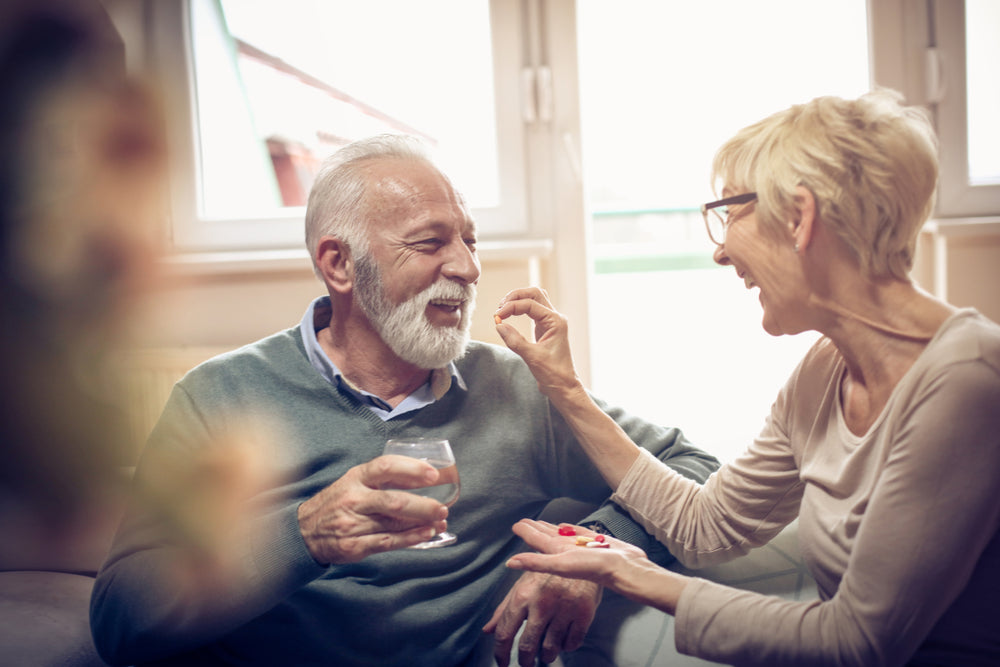Can You Lower Your Biological Age?

Have you ever wondered why some people are more sprightly at 85 than others at 55? Does it really all come down to lucky genes, or do they have a secret pass to the fountain of youth?
While we have yet to discover an actual mystical spring of eternal vitality, research in anti-aging and longevity proves you can slow down the aging process and lower your biological age.
Chronological Age vs. Biological Age
Chronological age is how many years we have been alive—the age we celebrate on our birthdays.
Biological age, on the other hand, measures how well our body functions relative to our actual age. We can get an idea of our biological age by looking at DNA methylation—a natural process that regulates gene expression throughout our lives. From a cell sample, the proportion of cells marked with DNA methylation determines the “age” of our bodies on a cellular level.
What Determines Biological Age?
Many factors can influence your biological age—including physical, mental, and cellular health. Some factors we can change (like diet or how often we exercise), while others are out of our control (like genetics or environmental toxins). When it comes to premature aging and the development of disease, research shows there are two main processes at play:
-
Oxidative Stress
When free radicals accumulate and outnumber the body's ability to neutralize them, oxidative stress occurs. This causes damaging inflammation, faster aging, and diseases like cancer and cardiovascular disease.
-
Telomere Shortening
Telomeres are caps at the ends of chromosomes that protect our DNA. As cells divide, these caps shrink and can no longer shield the chromosomes. Telomere shortening is a natural part of aging. Still, it is often accelerated by oxidative stress, inflammation, chronic stress, genetics, medical conditions, and unhealthy habits like smoking, poor diet, or a sedentary lifestyle.
While we can't stop oxidative stress and telomere shortening entirely, we can make healthy lifestyle choices that slow these processes down so we can age gracefully.
How to Lower Your Biological Age and Feel Younger
No matter your circumstances, there are ways you can influence your biology to slow down the aging process and feel younger for longer. Here are a few tips to turn back the clock:
Eat for longevity.
You are what you eat, right? A healthy diet provides all the nutrients our bodies need to repair damage and function optimally. Certain foods and diet styles (like the Mediterranean diet) may also specifically slow the aging process. Legumes, nuts, seeds, seaweed, and fresh fruits, for instance, are associated with longer telomeres and reduced signs of aging.
Reduce your toxic load.
Toxins are all around us—in our food, homes, and even the air we breathe. Unfortunately, these toxins ramp up oxidative stress in the body and can trigger hormone imbalances, mutations, weak immunity, and premature aging.
While we may not be able to avoid them entirely, we can significantly reduce our exposure to toxins and reduce the oxidative stress that damages and ages our cells.
-
Diet
Avoid highly-processed foods, foods with chemical additives, and foods high in sugar (which increases inflammation, glycation, and aging). Eat fresh, organic, and locally-grown foods whenever possible.
-
Personal Care
Look at your labels and you’ll be surprised to find many personal care products contain chemical fragrances, parabens, phthalates, heavy metals, formaldehyde, and other toxic ingredients. Make the switch to natural personal care products—especially products that absorb directly into your skin such as lotions, deodorants, soaps, etc.
-
Recreation
Alcohol and recreational drugs may help you take the edge off, but they can also take a toll on your body and expedite the aging process. Rather than wind down with a cocktail or two, sip an herbal tea without the side effects.
Tap into the power of hormesis.
Stress has become a dirty word in our high-pressure modern lives, but some stress is good for the body and can even promote longevity.
Consider fine wine; the best and most flavorful vintages come from hardy, resilient grapes that endured mildly stressful environmental conditions. The same goes for the human body. Certain therapies gently stress the body to trigger a healing response that repairs and restores the body more efficiently. This is called hormesis.
Red light therapy, exercise, cold water therapy, and acupuncture are examples of hormetic practices or therapies that may help slow—or even reverse—biological aging.
Embrace your inner child.
Biological aging isn’t just about your physical age. It’s also about how young and vibrant you feel. Managing mental and emotional stress is essential for living a long and healthy life, and embracing your inner child is a playful way to create balance.
Along with meditation and mindfulness practices, try connecting with your inner child. Take up a hobby you loved as a kid, get lost in your favorite childhood book, or get your hands dirty in the great outdoors. Not only will you enjoy some well-deserved stress relief, but you’ll also keep your mind and body young.
No matter the age on your birth certificate, you can live longer and feel younger by reducing your biological age. Practice these and other healthy lifestyle habits to take a daily “sip” from the fountain of youth.
Newsletter signup
Join the Joy Organics Family
Sign up and get updates on new products, as well as special coupons and discounts.
testimonials
What Our Clients Say
“This is a company that truly cares about its customers and providing the best CBD products currently available on the market.”










Join In On The Conversation
Your email address will not be published. Required fields are marked *
Comments will be approved before showing up.